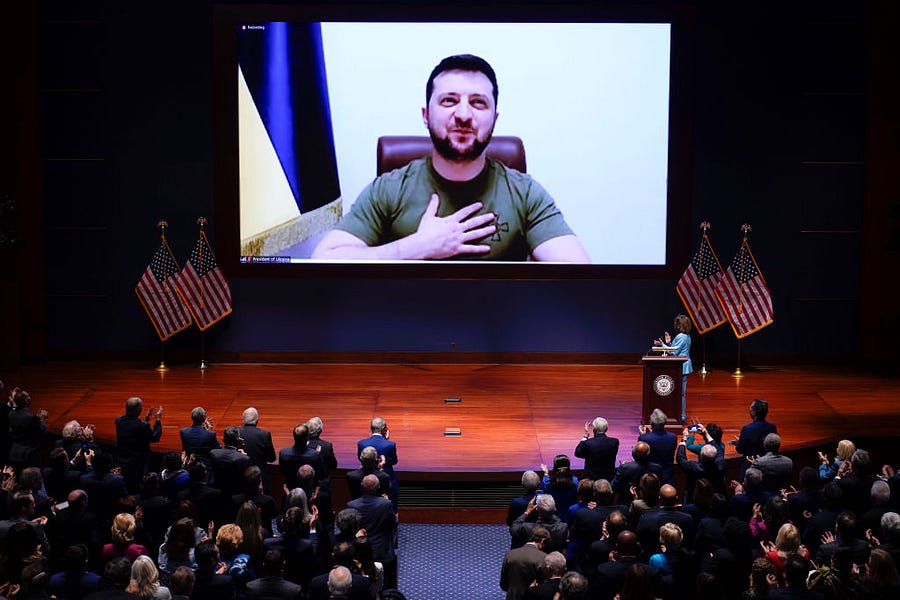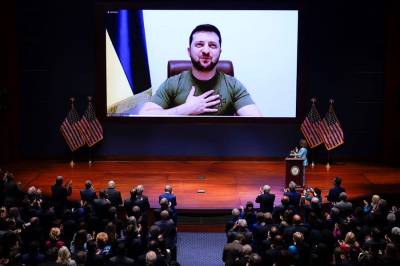Hi,
Earlier this morning, Volodymyr Zelensky delivered a moving address to the U.S. Congress. I have notes.
First, before I get to the substance, an icebreaker of an observation. I channel-surfed after he concluded his remarks, and one commentator after another made this super-insightful observation: Zelensky “tailored his remarks for an American audience.”
I don’t have any objection to the observation itself for the simple reason that it’s obviously true. But I thought the gravity and solemnity of it was pretty funny. The talking heads said it like the average viewer might have missed this apparently very clever rhetorical strategy when it was more of a “well, duh” point. It would have been really weird if he hadn’t tailored his remarks to the audience.
When Zelensky spoke to the Canadians earlier this week, he asked Parliament to imagine if Toronto or Vancouver were being attacked the way Ukrainian cities are. While that might have gotten vigorous applause from Lauren Boebert, I’m pretty sure most American legislators wouldn’t like to see that kind of carnage north of the 49th parallel. But more to the point, that would be a weird line for an American audience. Similarly, invoking Martin Luther King’s “I Have a Dream” speech or Pearl Harbor wouldn’t make too much sense speaking to the British.
Anyway, I thought the speech was very moving, but then again, I find his cause moving. I was a little conflicted about the video he played. On the one hand, I thought it was a brilliant thing for him to do and I don’t blame him one bit for doing it. If my country were being razed to the ground in a morally indefensible act of aggression, I’d do almost anything I could think of to save the lives of my countrymen. But even though I think his cause is righteous, there is some moral hazard in allowing a foreign leader to do that sort of thing. It was a propaganda video and it played on all of our television networks without any editorial speed bumps. I haven’t seen many complaints about the video, and that’s fine. Though I suspect it will eventually become one of those things media ethicists and other journalism thumbsuckers hold seminars on.
I should be clear about something. Propaganda has an understandably negative connotation today. But in its original sense, propaganda is a more neutral term. It simply means to “propagate” information. The term originates with the Catholic Church’s “Sacred Congregation for the Propagation of the Faith” in the 16th century. Putting theological objections aside, propaganda can be true. Strictly speaking, at least by the pre-19th century understanding, everything from government P.R. campaigns to get people vaccinated to Radio Free Europe are propaganda efforts.
Still, I’d like to think that congressional leaders put some thought into what they were agreeing to when they allowed that video to play. (Here it is, by the way).
I think it was worth doing given the extraordinary circumstance, but I’d hate to see such things become too ordinary.
Cut Zelensky some slack.
Let me circle back to my point about understanding Zelensky’s motivations. Every now and then, I notice on Twitter and elsewhere some veiled or even outright criticism of Zelensky for trying to convince NATO to impose a no-fly zone. I’m against a traditional no-fly zone, with American or NATO jets actively engaging Russian forces, for the now familiar reason that it would involve, well, American or NATO jets actively engaging Russian forces. I think Biden has made a terrible mistake publicly ruling it out preemptively. I have no problem with the White House ruling out a no-fly zone privately. But why reassure Putin that, no matter what he does, we won’t “escalate” in a way that would devastate Russia? Putin and his generals should be terrified of provoking us.
But here’s the point: I don’t blame Zelensky or the Ukrainians generally for trying to persuade us to do it. A lot of the people seem to think that the burden of restraint falls on Zelensky. I think this is utterly unrealistic and more than a little unfair. If you were in his shoes, do you really think you’d show such restraint? If you were a Ukrainian who saw your home destroyed and perhaps your family and friends killed, would you go into academic foreign policy mode and weigh the pros and cons? Yeah, I understand nuclear war is terrifying, but so is being shelled for weeks on end. So is rape and murder and starvation. Again, I think our answer to the request should be, “No,” but it’s quite the luxury to wag your finger at the Ukrainians for asking. Talk about needing to check your privilege.
Equal time?
It’s an interesting mental exercise to contemplate what would happen if Congress agreed to give Putin equal time. (Note: I do not think Congress should give Putin equal time.).The reason it’s useful is that it is impossible—for me at least—to think of an argument that Putin could offer to justify the invasion that wouldn’t be full of lies, omissions, and distortions. I often think about this in the context of the Israeli-Palestinian conflict. The Palestinians have more than a few legitimate complaints to make in various disputes. But when Hamas or Hezbollah target civilians, blow up pizza parlors, and murder random people, their defenses—-or the defenses offered by their apologists—-always require massive amounts of deceit.
Putin’s case, likewise, depends on massive lies about “denazification” and charges that the Ukrainian leaders are “drug addicts” and “degenerates.” He insists that his “special military operation”—itself a deceitful term—is a defensive operation, welcomed by Russian speakers in eastern Ukraine. Indeed, he’s still telling his own people that the Russian army is protecting civilians and is operating exclusively in the Donbas region.
It’s a useful heuristic. If one side in a conflict can’t or won’t tell the truth, it clarifies things.
A league of democracies, again.
There wasn’t a lot of news in Zelensky’s address. We knew he wanted more weapons, a no-fly zone, and support generally. But he did have one idea that I thought was interesting. He called for a new union of nations to respond to crises like the invasion of Ukraine much more quickly:
Institutions should protect us from war but they unfortunately do not work. We need new alliances and we offer them. We propose to create an association, united for peace, a union of responsible countries to stop conflict immediately, provide all the necessary assistance in 24 hours, weapons if necessary, sanctions if necessary, humanitarian support, finances, everything you need to keep the peace and quickly to save the world, to save life.
It’s worth pausing and thinking about why the United Nations isn’t doing this. The U.N. is supposed to handle peacekeeping and humanitarian aid. It’s doing some of the humanitarian stuff. But peacekeeping is impossible, probably for a bunch of reasons, but the foremost one is that Russia (and China) is on the U.N. Security Council and thus has a veto. There are lots of people who imbue the U.N. with almost unbounded moral authority. This has always struck me as ludicrous. At the heart of the U.N. is the doctrine of “might makes right.” The five permanent members of the Security Council aren’t there because they’re the best, noblest, or wisest nations. They are there because they’re the most powerful.
My litany of gripes against the U.N. is too long to get into here. People who defend the U.N. point to the things it does—that they like -- and say, “That’s why we need the U.N.” This has always struck me as a weak argument, like saying the government needs to collect garbage because garbage needs to be collected. Just because something is a necessity, doesn’t mean it’s necessary the government—-or the U.N.---do it. Still, if the U.N. is an efficient means of fighting malaria or delivering food, fine. Let it do that stuff (I use “efficient” advisedly).
Meanwhile, the U.N. is terrible at fighting for human rights, in large part because the worst countries in the world always capture the U.N. Human Rights Council, rendering it structurally antisemitic. In the U.N. General Assembly, crappy authoritarian countries get the same vote decent democratic ones do. I hate it when people anthropomorphize nation-states. (Putin’s insecurities are not Russia’s and we shouldn’t confuse them.) But imagine a club whose only standard for admittance is existence. If you’re a human, you’re welcome, and nothing else is required of you. That’s what the U.N. is for nation-states. Keep citizens in a gulag? That’s fine so long as you have borders and a central government. Plunder your nation’s resources and crush democracy? It’s all good bro, here’s your membership card.
Maybe it’s time for some competition from an organization with higher standards? I’ve been arguing for 20 years that America should create a “League of Democracies.” Requirements to join would be a good deal more stringent than mere existence. For starters, you’d have to be, you know, a democracy. I don’t mean that just in terms of having elections, but the full suite of stuff we associate with modern liberal democratic nations: the rule of law; civil rights (including property rights); the whole schmear. All of the NATO countries, save Turkey, could be members. But so could the rest of the EU, Japan, and Israel, as well as various Latin American and African countries. The nice thing about such a club is that it would provide an incentive for other nations to get their acts together if they wanted to join. The fact that democracies tend to be richer than non-democracies—not a coincidence, I might add—would just make the club all the more attractive (and powerful). We could come up with all sorts of benefits for membership—trade relations, mechanisms for mutual defense, etc. Moreover, having not only shared values, but superior values (yes, superior—have some civilizational confidence, you relativists) would make responding to crises easier.
Again, it wouldn’t replace the U.N., but it would provide a different venue and mechanism for working in concert with allies toward mutually desired ends. I honestly don’t know that pre-invasion Ukraine would have qualified for membership. But I certainly believe that Zelensky would have wanted to belong, for much the same reason he wanted to belong to the EU and NATO. A League of Democracies would incentivize countries to get their houses in order. We could even have T-shirts made.
I’m a big supporter of NATO, but NATO’s critics have a point when they say it’s an institution crafted for a world that no longer exists (the same is true, by the way, of the U.N.). Just as a League of Democracies wouldn’t supplant the U.N.—though it would marginalize it if the U.N. didn’t respond to the competitive pressure—a League of Democracies wouldn’t supplant NATO. It would give the U.S. a different avenue to work its will when necessary and lend material, political, and diplomatic support to other democracies. Zelensky didn’t pitch his idea as a League of Democracies—he has more pressing matters on his mind—but he did explicitly pitch his address to the United States as the “leader of the free world.”
It may make me out of step with some folks these days, but I think we should remain the leader of the free world, because it’s good for America and for the world. To that end, why not create an institution for the free world, too?







Please note that we at The Dispatch hold ourselves, our work, and our commenters to a higher standard than other places on the internet. We welcome comments that foster genuine debate or discussion—including comments critical of us or our work—but responses that include ad hominem attacks on fellow Dispatch members or are intended to stoke fear and anger may be moderated.
With your membership, you only have the ability to comment on The Morning Dispatch articles. Consider upgrading to join the conversation everywhere.